Understanding the Lived Experience of Chronic Illness: Diabetes Type 2
VerifiedAdded on 2023/01/12
|8
|2103
|62
AI Summary
This article delves into the lived experience of individuals with Type 2 Diabetes, exploring the challenges they face in managing their health, maintaining personal and professional relationships, and interacting with healthcare providers. The author shares personal anecdotes and insights, highlighting the need for lifestyle changes and support within the Greek ethnic immigrant community in Australia. The article concludes with recommendations for improving health outcomes and reducing the prevalence of Type 2 Diabetes in this population.
Contribute Materials
Your contribution can guide someone’s learning journey. Share your
documents today.
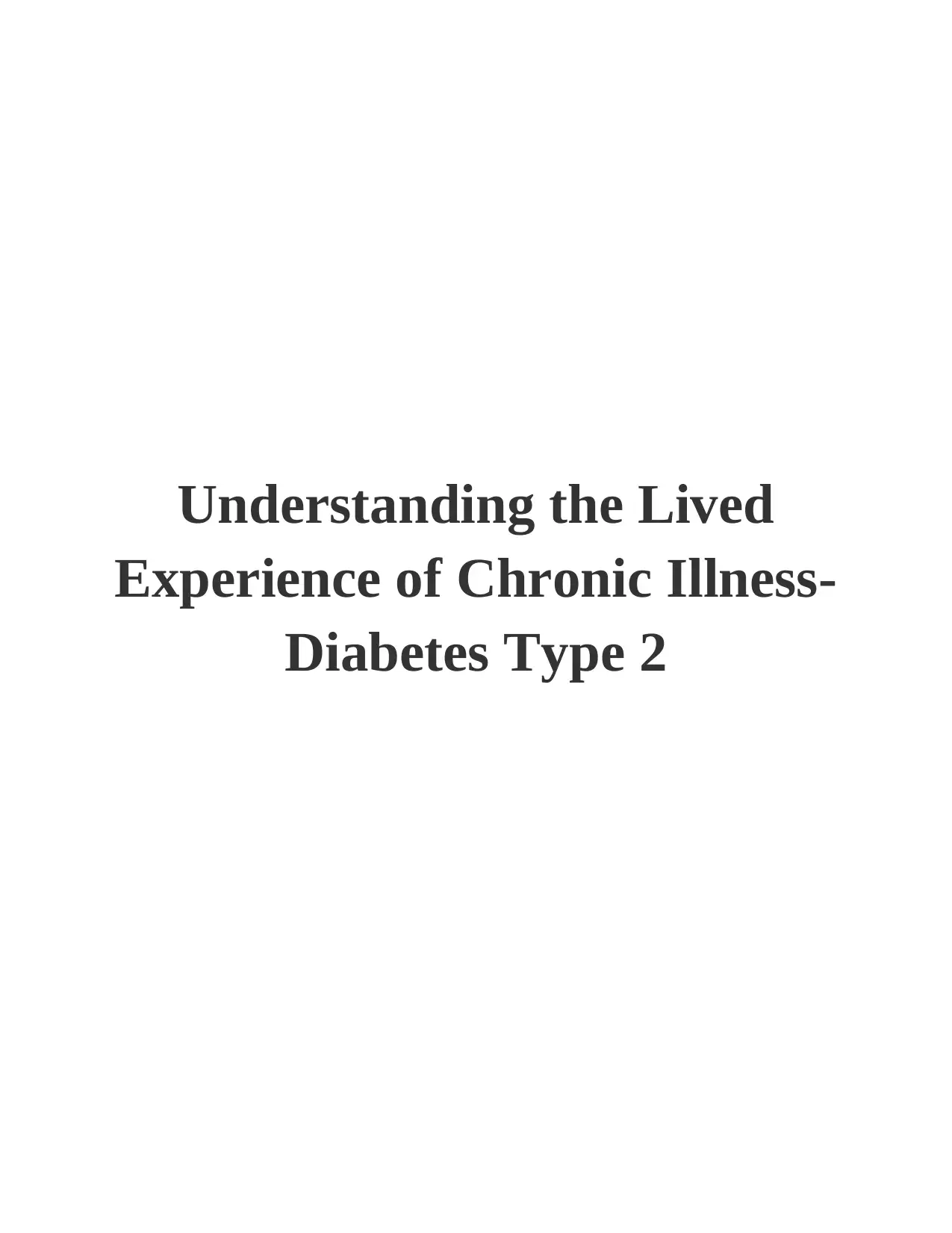
Understanding the Lived
Experience of Chronic Illness-
Diabetes Type 2
Experience of Chronic Illness-
Diabetes Type 2
Secure Best Marks with AI Grader
Need help grading? Try our AI Grader for instant feedback on your assignments.
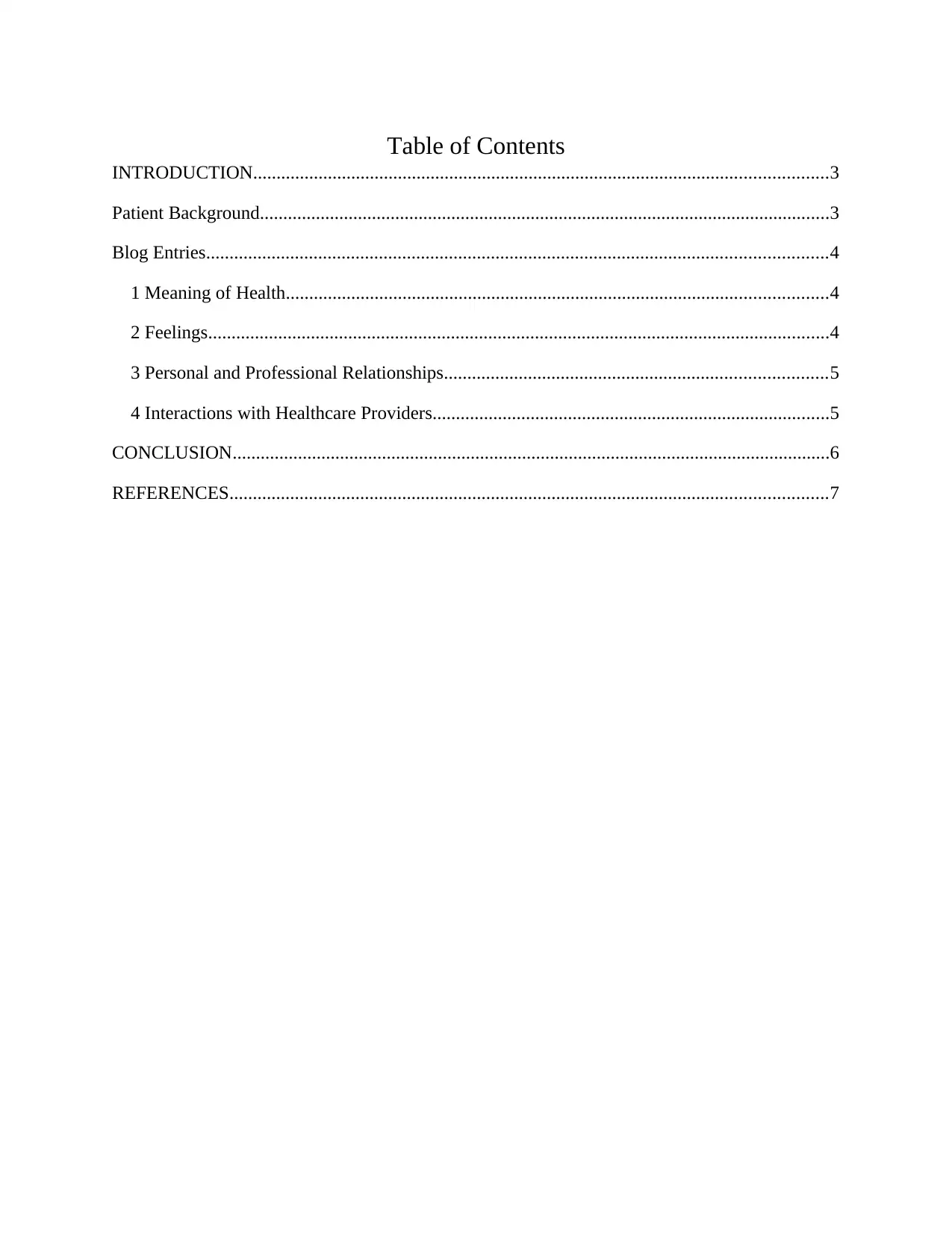
Table of Contents
INTRODUCTION...........................................................................................................................3
Patient Background..........................................................................................................................3
Blog Entries.....................................................................................................................................4
1 Meaning of Health....................................................................................................................4
2 Feelings.....................................................................................................................................4
3 Personal and Professional Relationships..................................................................................5
4 Interactions with Healthcare Providers.....................................................................................5
CONCLUSION................................................................................................................................6
REFERENCES................................................................................................................................7
INTRODUCTION...........................................................................................................................3
Patient Background..........................................................................................................................3
Blog Entries.....................................................................................................................................4
1 Meaning of Health....................................................................................................................4
2 Feelings.....................................................................................................................................4
3 Personal and Professional Relationships..................................................................................5
4 Interactions with Healthcare Providers.....................................................................................5
CONCLUSION................................................................................................................................6
REFERENCES................................................................................................................................7
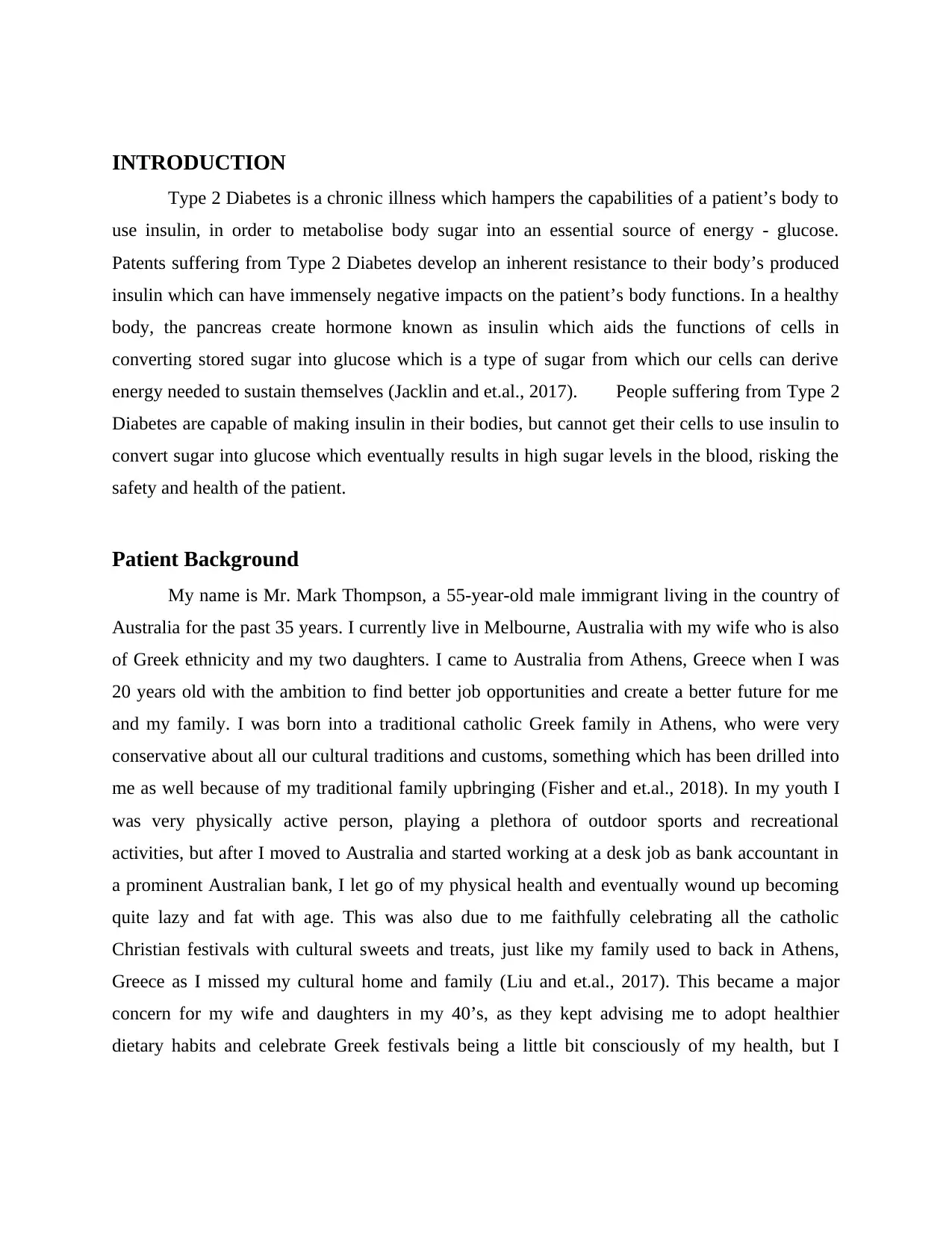
INTRODUCTION
Type 2 Diabetes is a chronic illness which hampers the capabilities of a patient’s body to
use insulin, in order to metabolise body sugar into an essential source of energy - glucose.
Patents suffering from Type 2 Diabetes develop an inherent resistance to their body’s produced
insulin which can have immensely negative impacts on the patient’s body functions. In a healthy
body, the pancreas create hormone known as insulin which aids the functions of cells in
converting stored sugar into glucose which is a type of sugar from which our cells can derive
energy needed to sustain themselves (Jacklin and et.al., 2017). People suffering from Type 2
Diabetes are capable of making insulin in their bodies, but cannot get their cells to use insulin to
convert sugar into glucose which eventually results in high sugar levels in the blood, risking the
safety and health of the patient.
Patient Background
My name is Mr. Mark Thompson, a 55-year-old male immigrant living in the country of
Australia for the past 35 years. I currently live in Melbourne, Australia with my wife who is also
of Greek ethnicity and my two daughters. I came to Australia from Athens, Greece when I was
20 years old with the ambition to find better job opportunities and create a better future for me
and my family. I was born into a traditional catholic Greek family in Athens, who were very
conservative about all our cultural traditions and customs, something which has been drilled into
me as well because of my traditional family upbringing (Fisher and et.al., 2018). In my youth I
was very physically active person, playing a plethora of outdoor sports and recreational
activities, but after I moved to Australia and started working at a desk job as bank accountant in
a prominent Australian bank, I let go of my physical health and eventually wound up becoming
quite lazy and fat with age. This was also due to me faithfully celebrating all the catholic
Christian festivals with cultural sweets and treats, just like my family used to back in Athens,
Greece as I missed my cultural home and family (Liu and et.al., 2017). This became a major
concern for my wife and daughters in my 40’s, as they kept advising me to adopt healthier
dietary habits and celebrate Greek festivals being a little bit consciously of my health, but I
Type 2 Diabetes is a chronic illness which hampers the capabilities of a patient’s body to
use insulin, in order to metabolise body sugar into an essential source of energy - glucose.
Patents suffering from Type 2 Diabetes develop an inherent resistance to their body’s produced
insulin which can have immensely negative impacts on the patient’s body functions. In a healthy
body, the pancreas create hormone known as insulin which aids the functions of cells in
converting stored sugar into glucose which is a type of sugar from which our cells can derive
energy needed to sustain themselves (Jacklin and et.al., 2017). People suffering from Type 2
Diabetes are capable of making insulin in their bodies, but cannot get their cells to use insulin to
convert sugar into glucose which eventually results in high sugar levels in the blood, risking the
safety and health of the patient.
Patient Background
My name is Mr. Mark Thompson, a 55-year-old male immigrant living in the country of
Australia for the past 35 years. I currently live in Melbourne, Australia with my wife who is also
of Greek ethnicity and my two daughters. I came to Australia from Athens, Greece when I was
20 years old with the ambition to find better job opportunities and create a better future for me
and my family. I was born into a traditional catholic Greek family in Athens, who were very
conservative about all our cultural traditions and customs, something which has been drilled into
me as well because of my traditional family upbringing (Fisher and et.al., 2018). In my youth I
was very physically active person, playing a plethora of outdoor sports and recreational
activities, but after I moved to Australia and started working at a desk job as bank accountant in
a prominent Australian bank, I let go of my physical health and eventually wound up becoming
quite lazy and fat with age. This was also due to me faithfully celebrating all the catholic
Christian festivals with cultural sweets and treats, just like my family used to back in Athens,
Greece as I missed my cultural home and family (Liu and et.al., 2017). This became a major
concern for my wife and daughters in my 40’s, as they kept advising me to adopt healthier
dietary habits and celebrate Greek festivals being a little bit consciously of my health, but I
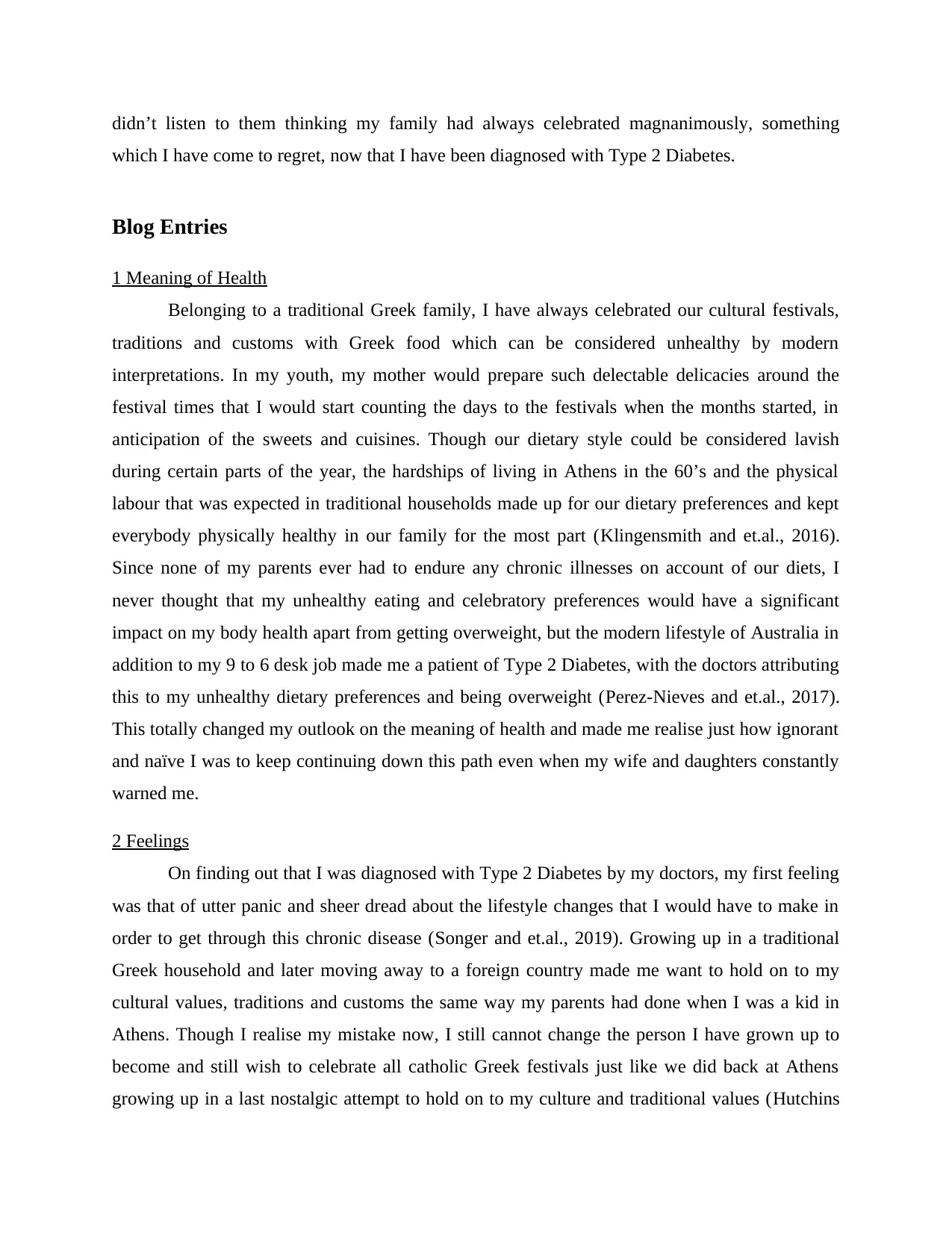
didn’t listen to them thinking my family had always celebrated magnanimously, something
which I have come to regret, now that I have been diagnosed with Type 2 Diabetes.
Blog Entries
1 Meaning of Health
Belonging to a traditional Greek family, I have always celebrated our cultural festivals,
traditions and customs with Greek food which can be considered unhealthy by modern
interpretations. In my youth, my mother would prepare such delectable delicacies around the
festival times that I would start counting the days to the festivals when the months started, in
anticipation of the sweets and cuisines. Though our dietary style could be considered lavish
during certain parts of the year, the hardships of living in Athens in the 60’s and the physical
labour that was expected in traditional households made up for our dietary preferences and kept
everybody physically healthy in our family for the most part (Klingensmith and et.al., 2016).
Since none of my parents ever had to endure any chronic illnesses on account of our diets, I
never thought that my unhealthy eating and celebratory preferences would have a significant
impact on my body health apart from getting overweight, but the modern lifestyle of Australia in
addition to my 9 to 6 desk job made me a patient of Type 2 Diabetes, with the doctors attributing
this to my unhealthy dietary preferences and being overweight (Perez-Nieves and et.al., 2017).
This totally changed my outlook on the meaning of health and made me realise just how ignorant
and naïve I was to keep continuing down this path even when my wife and daughters constantly
warned me.
2 Feelings
On finding out that I was diagnosed with Type 2 Diabetes by my doctors, my first feeling
was that of utter panic and sheer dread about the lifestyle changes that I would have to make in
order to get through this chronic disease (Songer and et.al., 2019). Growing up in a traditional
Greek household and later moving away to a foreign country made me want to hold on to my
cultural values, traditions and customs the same way my parents had done when I was a kid in
Athens. Though I realise my mistake now, I still cannot change the person I have grown up to
become and still wish to celebrate all catholic Greek festivals just like we did back at Athens
growing up in a last nostalgic attempt to hold on to my culture and traditional values (Hutchins
which I have come to regret, now that I have been diagnosed with Type 2 Diabetes.
Blog Entries
1 Meaning of Health
Belonging to a traditional Greek family, I have always celebrated our cultural festivals,
traditions and customs with Greek food which can be considered unhealthy by modern
interpretations. In my youth, my mother would prepare such delectable delicacies around the
festival times that I would start counting the days to the festivals when the months started, in
anticipation of the sweets and cuisines. Though our dietary style could be considered lavish
during certain parts of the year, the hardships of living in Athens in the 60’s and the physical
labour that was expected in traditional households made up for our dietary preferences and kept
everybody physically healthy in our family for the most part (Klingensmith and et.al., 2016).
Since none of my parents ever had to endure any chronic illnesses on account of our diets, I
never thought that my unhealthy eating and celebratory preferences would have a significant
impact on my body health apart from getting overweight, but the modern lifestyle of Australia in
addition to my 9 to 6 desk job made me a patient of Type 2 Diabetes, with the doctors attributing
this to my unhealthy dietary preferences and being overweight (Perez-Nieves and et.al., 2017).
This totally changed my outlook on the meaning of health and made me realise just how ignorant
and naïve I was to keep continuing down this path even when my wife and daughters constantly
warned me.
2 Feelings
On finding out that I was diagnosed with Type 2 Diabetes by my doctors, my first feeling
was that of utter panic and sheer dread about the lifestyle changes that I would have to make in
order to get through this chronic disease (Songer and et.al., 2019). Growing up in a traditional
Greek household and later moving away to a foreign country made me want to hold on to my
cultural values, traditions and customs the same way my parents had done when I was a kid in
Athens. Though I realise my mistake now, I still cannot change the person I have grown up to
become and still wish to celebrate all catholic Greek festivals just like we did back at Athens
growing up in a last nostalgic attempt to hold on to my culture and traditional values (Hutchins
Secure Best Marks with AI Grader
Need help grading? Try our AI Grader for instant feedback on your assignments.
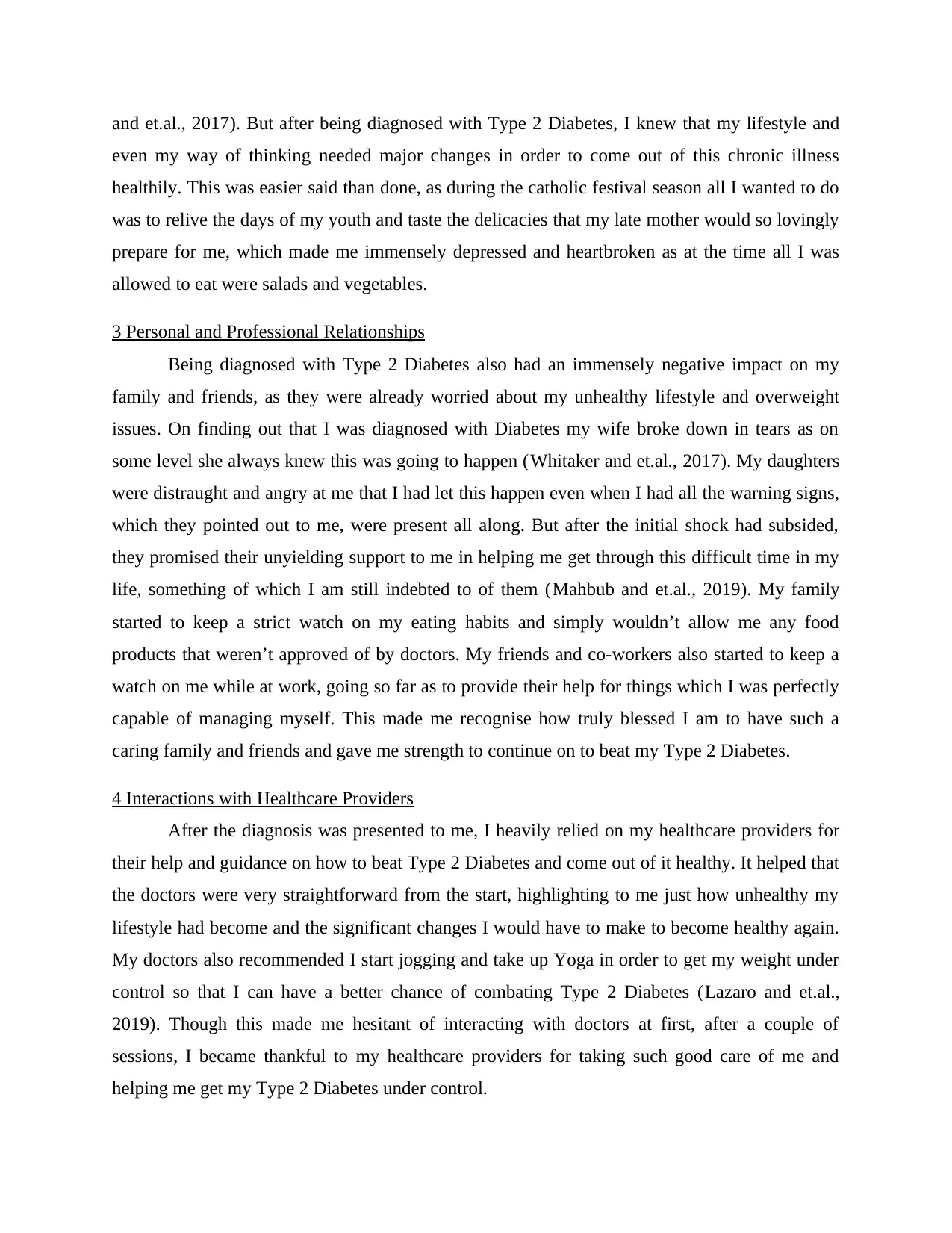
and et.al., 2017). But after being diagnosed with Type 2 Diabetes, I knew that my lifestyle and
even my way of thinking needed major changes in order to come out of this chronic illness
healthily. This was easier said than done, as during the catholic festival season all I wanted to do
was to relive the days of my youth and taste the delicacies that my late mother would so lovingly
prepare for me, which made me immensely depressed and heartbroken as at the time all I was
allowed to eat were salads and vegetables.
3 Personal and Professional Relationships
Being diagnosed with Type 2 Diabetes also had an immensely negative impact on my
family and friends, as they were already worried about my unhealthy lifestyle and overweight
issues. On finding out that I was diagnosed with Diabetes my wife broke down in tears as on
some level she always knew this was going to happen (Whitaker and et.al., 2017). My daughters
were distraught and angry at me that I had let this happen even when I had all the warning signs,
which they pointed out to me, were present all along. But after the initial shock had subsided,
they promised their unyielding support to me in helping me get through this difficult time in my
life, something of which I am still indebted to of them (Mahbub and et.al., 2019). My family
started to keep a strict watch on my eating habits and simply wouldn’t allow me any food
products that weren’t approved of by doctors. My friends and co-workers also started to keep a
watch on me while at work, going so far as to provide their help for things which I was perfectly
capable of managing myself. This made me recognise how truly blessed I am to have such a
caring family and friends and gave me strength to continue on to beat my Type 2 Diabetes.
4 Interactions with Healthcare Providers
After the diagnosis was presented to me, I heavily relied on my healthcare providers for
their help and guidance on how to beat Type 2 Diabetes and come out of it healthy. It helped that
the doctors were very straightforward from the start, highlighting to me just how unhealthy my
lifestyle had become and the significant changes I would have to make to become healthy again.
My doctors also recommended I start jogging and take up Yoga in order to get my weight under
control so that I can have a better chance of combating Type 2 Diabetes (Lazaro and et.al.,
2019). Though this made me hesitant of interacting with doctors at first, after a couple of
sessions, I became thankful to my healthcare providers for taking such good care of me and
helping me get my Type 2 Diabetes under control.
even my way of thinking needed major changes in order to come out of this chronic illness
healthily. This was easier said than done, as during the catholic festival season all I wanted to do
was to relive the days of my youth and taste the delicacies that my late mother would so lovingly
prepare for me, which made me immensely depressed and heartbroken as at the time all I was
allowed to eat were salads and vegetables.
3 Personal and Professional Relationships
Being diagnosed with Type 2 Diabetes also had an immensely negative impact on my
family and friends, as they were already worried about my unhealthy lifestyle and overweight
issues. On finding out that I was diagnosed with Diabetes my wife broke down in tears as on
some level she always knew this was going to happen (Whitaker and et.al., 2017). My daughters
were distraught and angry at me that I had let this happen even when I had all the warning signs,
which they pointed out to me, were present all along. But after the initial shock had subsided,
they promised their unyielding support to me in helping me get through this difficult time in my
life, something of which I am still indebted to of them (Mahbub and et.al., 2019). My family
started to keep a strict watch on my eating habits and simply wouldn’t allow me any food
products that weren’t approved of by doctors. My friends and co-workers also started to keep a
watch on me while at work, going so far as to provide their help for things which I was perfectly
capable of managing myself. This made me recognise how truly blessed I am to have such a
caring family and friends and gave me strength to continue on to beat my Type 2 Diabetes.
4 Interactions with Healthcare Providers
After the diagnosis was presented to me, I heavily relied on my healthcare providers for
their help and guidance on how to beat Type 2 Diabetes and come out of it healthy. It helped that
the doctors were very straightforward from the start, highlighting to me just how unhealthy my
lifestyle had become and the significant changes I would have to make to become healthy again.
My doctors also recommended I start jogging and take up Yoga in order to get my weight under
control so that I can have a better chance of combating Type 2 Diabetes (Lazaro and et.al.,
2019). Though this made me hesitant of interacting with doctors at first, after a couple of
sessions, I became thankful to my healthcare providers for taking such good care of me and
helping me get my Type 2 Diabetes under control.
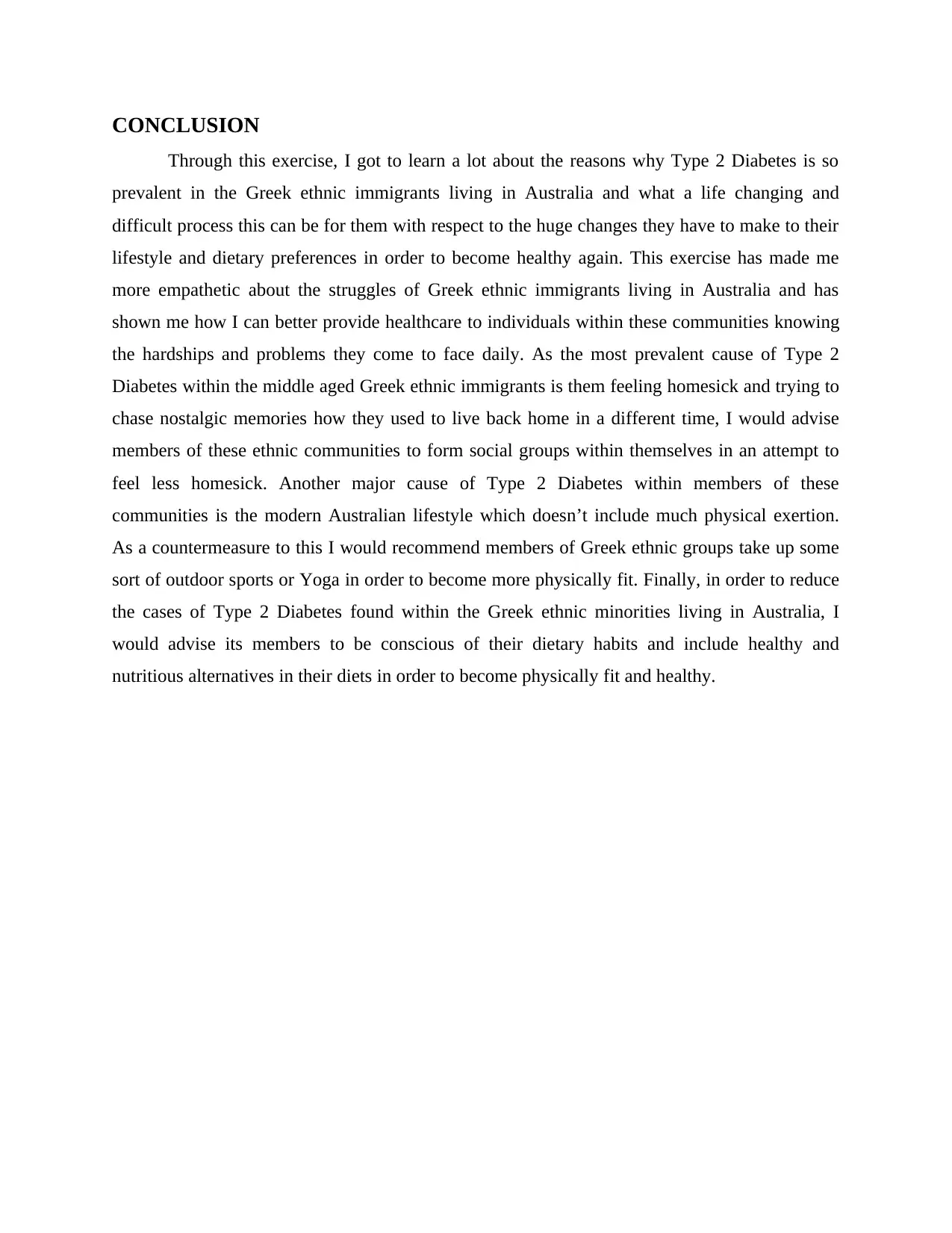
CONCLUSION
Through this exercise, I got to learn a lot about the reasons why Type 2 Diabetes is so
prevalent in the Greek ethnic immigrants living in Australia and what a life changing and
difficult process this can be for them with respect to the huge changes they have to make to their
lifestyle and dietary preferences in order to become healthy again. This exercise has made me
more empathetic about the struggles of Greek ethnic immigrants living in Australia and has
shown me how I can better provide healthcare to individuals within these communities knowing
the hardships and problems they come to face daily. As the most prevalent cause of Type 2
Diabetes within the middle aged Greek ethnic immigrants is them feeling homesick and trying to
chase nostalgic memories how they used to live back home in a different time, I would advise
members of these ethnic communities to form social groups within themselves in an attempt to
feel less homesick. Another major cause of Type 2 Diabetes within members of these
communities is the modern Australian lifestyle which doesn’t include much physical exertion.
As a countermeasure to this I would recommend members of Greek ethnic groups take up some
sort of outdoor sports or Yoga in order to become more physically fit. Finally, in order to reduce
the cases of Type 2 Diabetes found within the Greek ethnic minorities living in Australia, I
would advise its members to be conscious of their dietary habits and include healthy and
nutritious alternatives in their diets in order to become physically fit and healthy.
Through this exercise, I got to learn a lot about the reasons why Type 2 Diabetes is so
prevalent in the Greek ethnic immigrants living in Australia and what a life changing and
difficult process this can be for them with respect to the huge changes they have to make to their
lifestyle and dietary preferences in order to become healthy again. This exercise has made me
more empathetic about the struggles of Greek ethnic immigrants living in Australia and has
shown me how I can better provide healthcare to individuals within these communities knowing
the hardships and problems they come to face daily. As the most prevalent cause of Type 2
Diabetes within the middle aged Greek ethnic immigrants is them feeling homesick and trying to
chase nostalgic memories how they used to live back home in a different time, I would advise
members of these ethnic communities to form social groups within themselves in an attempt to
feel less homesick. Another major cause of Type 2 Diabetes within members of these
communities is the modern Australian lifestyle which doesn’t include much physical exertion.
As a countermeasure to this I would recommend members of Greek ethnic groups take up some
sort of outdoor sports or Yoga in order to become more physically fit. Finally, in order to reduce
the cases of Type 2 Diabetes found within the Greek ethnic minorities living in Australia, I
would advise its members to be conscious of their dietary habits and include healthy and
nutritious alternatives in their diets in order to become physically fit and healthy.
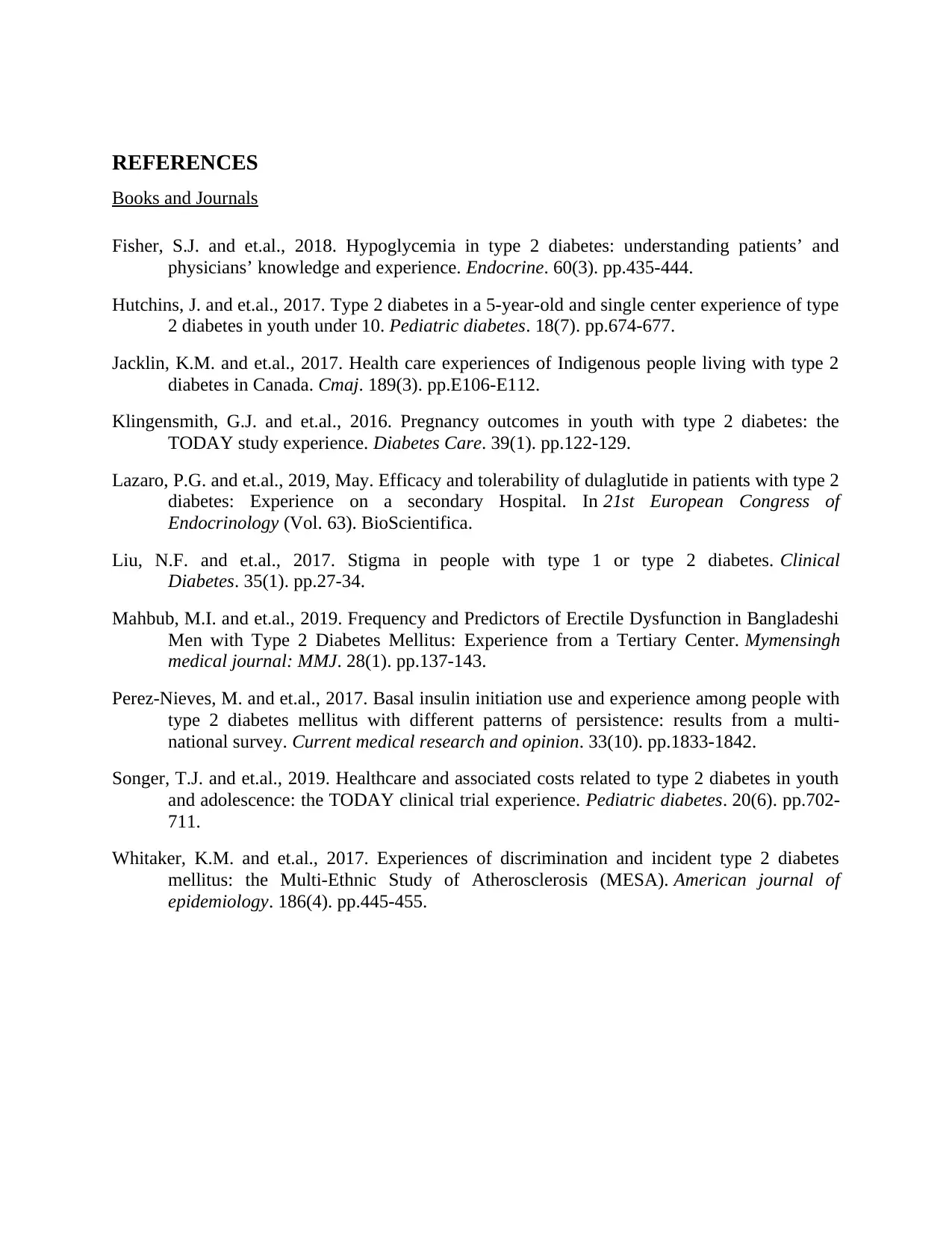
REFERENCES
Books and Journals
Fisher, S.J. and et.al., 2018. Hypoglycemia in type 2 diabetes: understanding patients’ and
physicians’ knowledge and experience. Endocrine. 60(3). pp.435-444.
Hutchins, J. and et.al., 2017. Type 2 diabetes in a 5‐year‐old and single center experience of type
2 diabetes in youth under 10. Pediatric diabetes. 18(7). pp.674-677.
Jacklin, K.M. and et.al., 2017. Health care experiences of Indigenous people living with type 2
diabetes in Canada. Cmaj. 189(3). pp.E106-E112.
Klingensmith, G.J. and et.al., 2016. Pregnancy outcomes in youth with type 2 diabetes: the
TODAY study experience. Diabetes Care. 39(1). pp.122-129.
Lazaro, P.G. and et.al., 2019, May. Efficacy and tolerability of dulaglutide in patients with type 2
diabetes: Experience on a secondary Hospital. In 21st European Congress of
Endocrinology (Vol. 63). BioScientifica.
Liu, N.F. and et.al., 2017. Stigma in people with type 1 or type 2 diabetes. Clinical
Diabetes. 35(1). pp.27-34.
Mahbub, M.I. and et.al., 2019. Frequency and Predictors of Erectile Dysfunction in Bangladeshi
Men with Type 2 Diabetes Mellitus: Experience from a Tertiary Center. Mymensingh
medical journal: MMJ. 28(1). pp.137-143.
Perez-Nieves, M. and et.al., 2017. Basal insulin initiation use and experience among people with
type 2 diabetes mellitus with different patterns of persistence: results from a multi-
national survey. Current medical research and opinion. 33(10). pp.1833-1842.
Songer, T.J. and et.al., 2019. Healthcare and associated costs related to type 2 diabetes in youth
and adolescence: the TODAY clinical trial experience. Pediatric diabetes. 20(6). pp.702-
711.
Whitaker, K.M. and et.al., 2017. Experiences of discrimination and incident type 2 diabetes
mellitus: the Multi-Ethnic Study of Atherosclerosis (MESA). American journal of
epidemiology. 186(4). pp.445-455.
Books and Journals
Fisher, S.J. and et.al., 2018. Hypoglycemia in type 2 diabetes: understanding patients’ and
physicians’ knowledge and experience. Endocrine. 60(3). pp.435-444.
Hutchins, J. and et.al., 2017. Type 2 diabetes in a 5‐year‐old and single center experience of type
2 diabetes in youth under 10. Pediatric diabetes. 18(7). pp.674-677.
Jacklin, K.M. and et.al., 2017. Health care experiences of Indigenous people living with type 2
diabetes in Canada. Cmaj. 189(3). pp.E106-E112.
Klingensmith, G.J. and et.al., 2016. Pregnancy outcomes in youth with type 2 diabetes: the
TODAY study experience. Diabetes Care. 39(1). pp.122-129.
Lazaro, P.G. and et.al., 2019, May. Efficacy and tolerability of dulaglutide in patients with type 2
diabetes: Experience on a secondary Hospital. In 21st European Congress of
Endocrinology (Vol. 63). BioScientifica.
Liu, N.F. and et.al., 2017. Stigma in people with type 1 or type 2 diabetes. Clinical
Diabetes. 35(1). pp.27-34.
Mahbub, M.I. and et.al., 2019. Frequency and Predictors of Erectile Dysfunction in Bangladeshi
Men with Type 2 Diabetes Mellitus: Experience from a Tertiary Center. Mymensingh
medical journal: MMJ. 28(1). pp.137-143.
Perez-Nieves, M. and et.al., 2017. Basal insulin initiation use and experience among people with
type 2 diabetes mellitus with different patterns of persistence: results from a multi-
national survey. Current medical research and opinion. 33(10). pp.1833-1842.
Songer, T.J. and et.al., 2019. Healthcare and associated costs related to type 2 diabetes in youth
and adolescence: the TODAY clinical trial experience. Pediatric diabetes. 20(6). pp.702-
711.
Whitaker, K.M. and et.al., 2017. Experiences of discrimination and incident type 2 diabetes
mellitus: the Multi-Ethnic Study of Atherosclerosis (MESA). American journal of
epidemiology. 186(4). pp.445-455.
Paraphrase This Document
Need a fresh take? Get an instant paraphrase of this document with our AI Paraphraser

1 out of 8
Related Documents
Your All-in-One AI-Powered Toolkit for Academic Success.
+13062052269
info@desklib.com
Available 24*7 on WhatsApp / Email
![[object Object]](/_next/static/media/star-bottom.7253800d.svg)
Unlock your academic potential
© 2024 | Zucol Services PVT LTD | All rights reserved.





